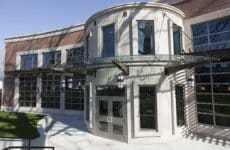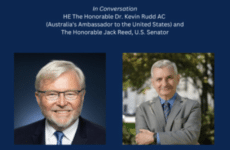By: David O’Reilly
Posted In: News

Photo credit: LAURENT ZABULON
After taking the name Pope Benedict XVI, German Cardinal Joseph Ratzinger greets the crowd in St. Peter´s Square in Vatican City, Rome.
VATICAN CITY- In electing the former Cardinal Joseph Ratzinger as the new pope, the cardinals of the Roman Catholic Church have chosen not only one of the most theologically conservative among their ranks, but also a brilliant German-born theologian whose worldview was shaped by Europe- and remains focused there.
As president of the Congregation for the Doctrine of the Faith, Pope Benedict XVI devoted much of his long Vatican career to condemning the “dictatorship of relativism”- the modernist notion that there are no universal truths or universal standards of right and wrong- and to asserting the Catholic vision of truth and morality. As pope, he will very likely continue John Paul II’s policy of a “strong Rome” that oversees dioceses closely and ensures that their teachings and practices are strictly orthodox. It remains to be seen if he’ll continue John Paul’s ecumenical outreach to other religions or if he’ll use the Throne of Peter as a pulpit to vigorously assert that only the Roman Catholic Church is the true means of salvation. In 2000, the Vatican issued a “Dominus Iesus” document, prepared by Benedict, that asserted the primacy of Roman Catholicism and called other churches and faiths “deficient.” Catholics who supposed they might get a pope who would re-examine the church’s position on celibate priesthood, artificial birth control, or full communion for divorced and remarried Catholics will be disappointed. Tradition and orthodoxy will surely be the hallmarks of Benedict’s pontificate. He not only condemns homosexuality as “an intrinsic moral evil” but also has suggested that Catholic altars should face east, to Jerusalem. Mild-mannered and cordial in his personal dealings, Benedict, 78, became one of the most trusted advisers to John Paul, who appointed him prefect, or president, of the Congregation for the Doctrine of the Faith in 1981. In recent years, John Paul several times turned down Benedict’s requests to retire to his native Germany. He was John Paul’s choice to be dean of the College of Cardinals, a position he took in 2002. It gave him exceptional visibility in the vacancy that followed John Paul’s death. As cardinal dean, Benedict was the principal celebrant and homilist at the late pope’s funeral and at the special Mass in St. Peter’s Basilica on the opening day of the conclave. It was at the latter that he warned his brother cardinals against the “dictatorship of relativism” and urged them to “resist the trends and novelties” sweeping the increasingly secularized West. His choice of the word “dictatorship” is revealing: As a young man growing up in Nazi Germany, he was profoundly repelled by Adolf Hitler’s ruinous corruptions of truth and morality. In his autobiography, Benedict described the Nazis as “fanatical ideologues who tyrannized us without respite.” He came to view the Catholic Church as the institution uniquely equipped to counter what he felt were forces that mock or distort traditional morals. “Having seen fascism in action, Benedict today believes the best antidote to political totalitarianism is ecclesial totalitarianism,” writes Vatican expert John Allen, Benedict’s biographer. In his 2002 book, “Conclave,” Allen described Benedict as leader of the “border patrol” faction within the College of Cardinals, a group that believes that “Catholicism must have the courage to speak its traditional truths boldly … in the face of a culture that no longer wants to hear them.” But as John Paul’s “enforcer” on matters of orthodoxy (he was jokingly dubbed the “panzerkardinal”), Benedict also became a polarizing figure within the Vatican and in the larger church. Some church liberals came to view him as an ideologue who tyrannized progressives who deviated from his vision of Catholicism. Soon after taking charge of the doctrine office (until 1908 it was called the Sacred Congregation for the Universal Inquisition), he reined in liberal academics who used their professorships at pontifical universities to challenge church teachings such as papal infallibility and the immorality of artificial birth control. He also cracked down on liberation theology, the confrontational social-justice campaign popular among Latin American clergy in the 1970s. Although its links to Marxism were tenuous, both Benedict and John Paul were repelled by liberationism’s talk of class warfare. Priests and bishops were ordered to stay out of politics- even as John Paul was helping topple communism in Poland. The new pope was born on April 16, 1927, in the German village of Marktl am Inn, the son of a rural policeman and a hotel cook who changed jobs frequently, in part because of his father’s outspoken criticism of the Nazis. In 1937, his father retired and moved to a suburb of Traustein, where Joseph spent most of his teen years. He studied Latin and Greek in gymnasium, the equivalent of high school, and entered minor seminary in 1939, at age 12. In 1943 and 1944, his studies were interrupted by compulsory wartime military service, but he deserted near the close of the war, in part because he was so repelled by the Nazi cause. He was briefly incarcerated by the Americans as a prisoner of war in 1945. In 1951, Benedict and his brother Georg were ordained priests, and in 1953 he earned his doctorate in theology from the University of Munich. In 1959, he became a full professor of theology at the University of Bonn. He served from 1962 to 1965 as the chief theological adviser to Cologne Cardinal Josef Frings at the Second Vatican Council, where he was regarded as one of the council’s more progressive thinkers. In 1966, Benedict was hired at the University of Tubingen at the encouragement of the liberal Hans Kung- whose theology he would later attack from his Vatican post. Benedict’s turn to conservatism was fueled in large part by the violent student protests that swept much of Europe, including Germany, in 1968. He later left Tubingen, became a theological adviser to the German bishops’ conference and in 1972 founded the magazine Communio, which offered a more traditional interpretation of the Second Vatican Council. ___ (O’Reilly reports for The Philadelphia Inquirer.) ___ c 2005, Knight Ridder/Tribune Information Services.













